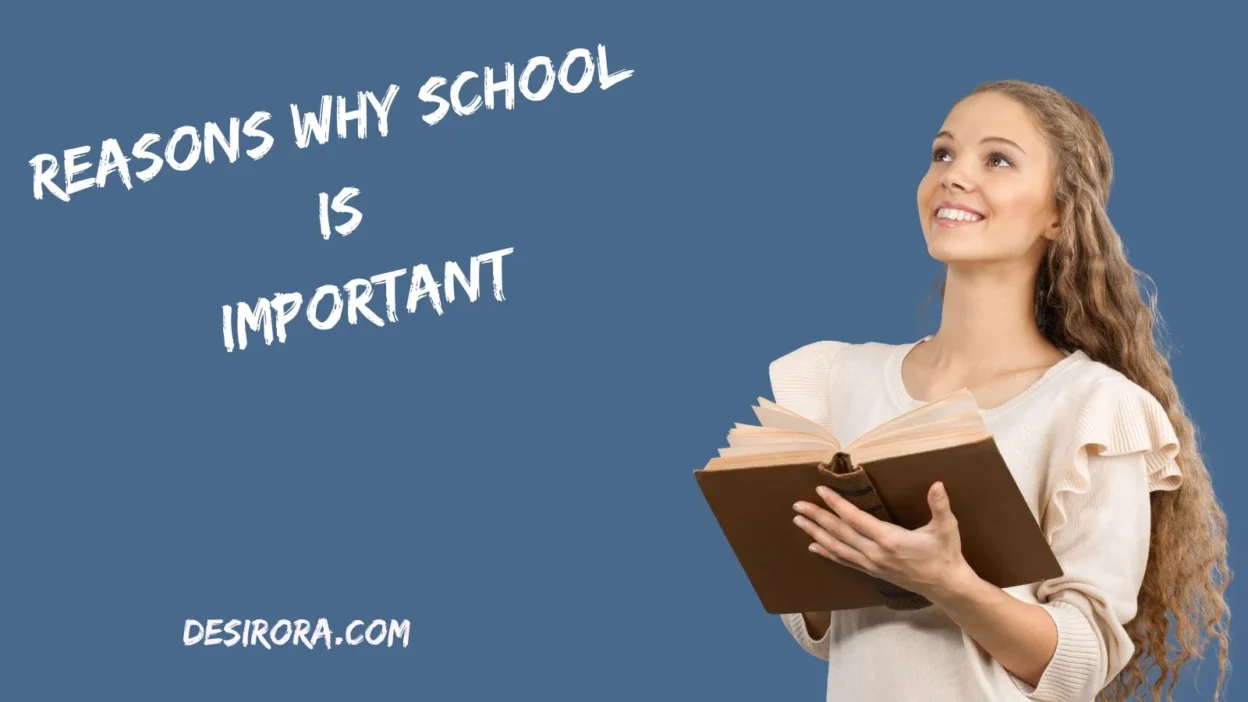School. For some, the word sparks warm memories of playground laughter, favorite teachers, or discovering a passion in art or science. For others, it may bring back thoughts of early mornings, heavy backpacks, or dreaded exams. But no matter where you fall on that spectrum, one thing is clear: school shapes our lives in ways we often don’t fully appreciate until later.
Education isn’t just about textbooks or grades—it’s about preparing us to navigate the world. It’s the foundation of personal growth, critical thinking, and social responsibility. In fact, the United Nations declared education a basic human right in 1948, emphasizing its power to transform societies and individuals alike.
Let’s break down the top reasons why school is important—for individuals, communities, and the world at large.
School Teaches Fundamental Skills for Life
Before we can analyze poetry or solve equations, school gives us the essentials:
- Reading and Writing – These aren’t just academic skills; they’re survival tools. Imagine trying to read medicine labels, follow job applications, or even send an email without them.
- Mathematics – From budgeting expenses to calculating interest rates, math sneaks into daily life.
- Communication – Schools train us to express ourselves clearly, whether through essays, debates, or group projects.
“An investment in knowledge pays the best interest.” – Benjamin Franklin
Here’s a synonym table to understand how these core skills are described in different contexts:
| Core Skill | Synonyms / Related Terms | Real-Life Application |
| Reading | Literacy, comprehension, analysis | Reading contracts, instructions |
| Writing | Composition, expression, articulation | Emails, reports, creative work |
| Mathematics | Arithmetic, numeracy, problem-solving | Budgeting, shopping, business |
| Communication | Dialogue, interaction, expression | Job interviews, teamwork, family |
Without these basics, life becomes like being a frog in a well—limited, unaware of the larger world outside.
Building Confidence, Self-Awareness, and Communication
School isn’t just about academics; it’s also where many of us find our voices. Standing up for show-and-tell in kindergarten, delivering a speech in high school, or even asking questions in class all build confidence and self-awareness.
- It teaches kids to recognize their strengths.
- It encourages self-expression.
- It provides feedback that helps students adjust, grow, and improve.
A confident child often becomes an independent adult who can make informed choices, defend opinions, and interact effectively in workplaces or communities.
A Foundation for Critical Thinking and Problem-Solving
Life throws curveballs: financial crises, workplace conflicts, unexpected challenges. Schools help us develop the mental toolkit to respond logically.
- Critical thinking – analyzing situations before making decisions.
- Problem-solving – weighing pros and cons to find solutions.
- Creativity – thinking outside the box.
For example, when a group project fails, students learn not just to blame, but to analyze mistakes and strategize improvements. These skills translate directly into real-world success, whether managing businesses, raising families, or addressing global issues.
Creativity, Innovation, and Lifelong Learning
Ever doodled in the margins of a notebook or composed music for a school event? Those aren’t distractions—they’re creative sparks. Schools encourage activities like:
- Music, theater, and art classes.
- Science fairs and innovation clubs.
- Writing competitions and debates.
This fosters a lifelong desire for learning that goes beyond formal education. Many inventors, artists, and entrepreneurs trace their first inspirations back to classrooms.
Access to Better Jobs, Income, and Financial Security
Education and earning potential go hand in hand. Studies show:
- A college graduate in the U.S. earns around $765,000 more over a lifetime compared to someone with only a high school diploma.
- Each additional year of schooling increases income by about 9% (World Bank).
Schools open the door to:
- Higher-paying jobs in medicine, law, technology, or business.
- Further educational pursuits, like specialized degrees.
- Financial security, which reduces stress and provides stability.
In short, school is an investment in your future wallet as well as your future wisdom.
Equal Opportunities and Reducing Social Gaps
School is a great equalizer. Whether you’re from a wealthy family or a disadvantaged background, schools provide access to knowledge that can level the playing field.
- Scholarships, grants, and free education programs help disadvantaged kids.
- NGOs worldwide sponsor orphaned or refugee children to attend schools.
- Governments provide school meals, books, and uniforms to reduce inequality.
“Education is the most powerful weapon which you can use to change the world.” – Nelson Mandela
By reducing social and gender gaps, schools ensure that girls, boys, and marginalized communities all have the chance to thrive.
Civic Engagement: How Schools Shape Responsible Citizens
Schools aren’t just about personal gain; they’re about building stronger societies. Civics classes, debates, and Model UN programs help students:
- Understand rights and responsibilities.
- Develop respect for laws and democratic values.
- Learn to participate in voting and community service.
An educated population is more likely to engage in civic duties, question misinformation, and contribute to democracy.
Schools as a Safe Space for Growth and Community
For many children, school is more than classrooms—it’s a second home.
- It provides structure and daily routines.
- It creates a safe environment away from risky situations.
- It gives children a sense of belonging and being part of something bigger.
Clubs, sports, and extracurriculars strengthen friendships and teach teamwork, empathy, and social awareness.
Education and Global Progress: Technology, Science, and Innovation
The modern world runs on innovation, and schools are its engine. Countries that invest in education consistently lead in:
- STEM advancements – science, technology, engineering, and mathematics.
- Entrepreneurship – turning ideas into businesses.
- Research and development – new medicines, sustainable energy, AI solutions.
For example, universities like MIT and Stanford are not just schools—they’re launchpads for technological revolutions.
Schools and Peacebuilding: Reducing Violence and Conflict
Schools promote values of peace and tolerance. When children learn empathy, respect, and ethics, they grow into adults less likely to be drawn into violence or extremism.
Educational programs worldwide show a direct link between higher literacy rates and lower crime levels. By teaching the difference between right and wrong, schools reduce global conflict.
The Human Right to Education: A Universal Perspective
The Universal Declaration of Human Rights (1948) declared education a basic right for every child. Yet millions of children remain out of school today due to poverty, wars, or displacement.
- In refugee camps across Africa, Syria, and Ukraine, NGOs fight to provide education.
- Sponsorship programs allow individuals to donate $100 a month to help an orphan attend school.
Education isn’t charity—it’s justice. It’s about giving every person the chance to build a dignified life.
How Education Breaks the Cycle of Poverty
Schooling is directly tied to economic mobility. Data shows:
- One extra year of schooling increases a person’s income and reduces poverty risk.
- Mothers with education are more likely to vaccinate children, reducing child mortality.
- Communities with higher literacy rates have better health, hygiene, and prosperity.
Education acts like a ladder out of poverty, one rung at a time.
The Link Between School and Health Outcomes
Educated people are more likely to:
- Understand health advisories, vaccinations, and hygiene practices.
- Afford doctors and healthcare services.
- Live longer, healthier lives.
For instance, UNESCO reports that if all mothers completed primary school, child deaths would reduce by 31% worldwide.
Mental Well-Being and Emotional Intelligence
School isn’t always stress-free, but it does teach resilience.
- Students learn to manage deadlines, exams, and responsibilities.
- Peer interactions develop empathy and emotional intelligence.
- Counseling services in schools address mental health challenges.
Education prepares students not just for success, but for the ups and downs of real life.
Extracurricular Activities: Beyond Textbooks and Classrooms
Not all learning happens in classrooms. Extracurriculars teach skills often missing in textbooks:
- Sports – teamwork, discipline, leadership.
- Clubs and societies – creativity, collaboration, exploration of interests.
- Volunteering – empathy, community service.
These activities shape well-rounded, socially aware individuals.
Cultural Awareness and Global Collaboration
In a globalized world, schools are bridges between cultures. Exchange programs, foreign language classes, and cultural events help students:
- Develop tolerance and inclusivity.
- Work with people from different socio-economic backgrounds.
- Prepare for international collaborations in careers.
Environmental Awareness and Sustainable Living
Schools play a key role in addressing climate change and sustainability. Through environmental education, students learn to:
- Reduce waste, recycle, and conserve energy.
- Adopt eco-friendly habits in daily life.
- Advocate for greener policies in their communities.
A child who plants a tree in school today may become an environmental leader tomorrow.
Quotes That Show Why School Is Important
- “Education is the passport to the future, for tomorrow belongs to those who prepare for it today.” – Malcolm X
- “Education is not preparation for life; education is life itself.” – John Dewey
- “An investment in knowledge pays the best interest.” – Benjamin Franklin
Common Misconceptions: Is School a Waste of Time?
Some students feel school is boring, frustrating, or pointless. But consider this:
- Even disliked subjects like math or history train the brain in logic and analysis.
- Social interactions at school prepare you for real-world teamwork.
- Basic literacy protects against fraud, misinformation, and exploitation.
Skipping school may seem tempting, but in the long run, it’s like throwing away a winning lottery ticket before scratching it.
Final Thoughts: School as the Cornerstone of a Better Tomorrow
School is more than a building, more than teachers, more than homework. It’s the foundation of opportunity, equality, and progress. It shapes confident individuals, strong societies, and a more peaceful, innovative world.
Education isn’t just about grades—it’s about growth, resilience, and dreams. Whether you’re a student, parent, or policymaker, investing in education means investing in the future of humanity.
FAQs on Reasons Why School Is Important
Q1. Why is school important for personal development?
School builds essential life skills like reading, communication, and problem-solving while fostering self-awareness and confidence.
Q2. How does school impact career opportunities?
Education increases employability, income, and access to higher-paying jobs, securing long-term financial stability.
Q3. Is school equally important for children?
Yes. Education combats gender inequality, empowers girls, and reduces early marriages and maternal mortality rates.
Q4. Can school really reduce poverty?
Absolutely. Studies show each additional year of schooling increases earnings and reduces poverty risk by up to 9%.
Q5. Is school only about academics?
Not at all. Extracurriculars, sports, and clubs teach leadership, teamwork, empathy, and creativity beyond textbooks.

Aldous Huxley was a visionary writer and philosopher whose works explored human nature, consciousness, and the future of society. His ideas continue to challenge minds and inspire generations.



